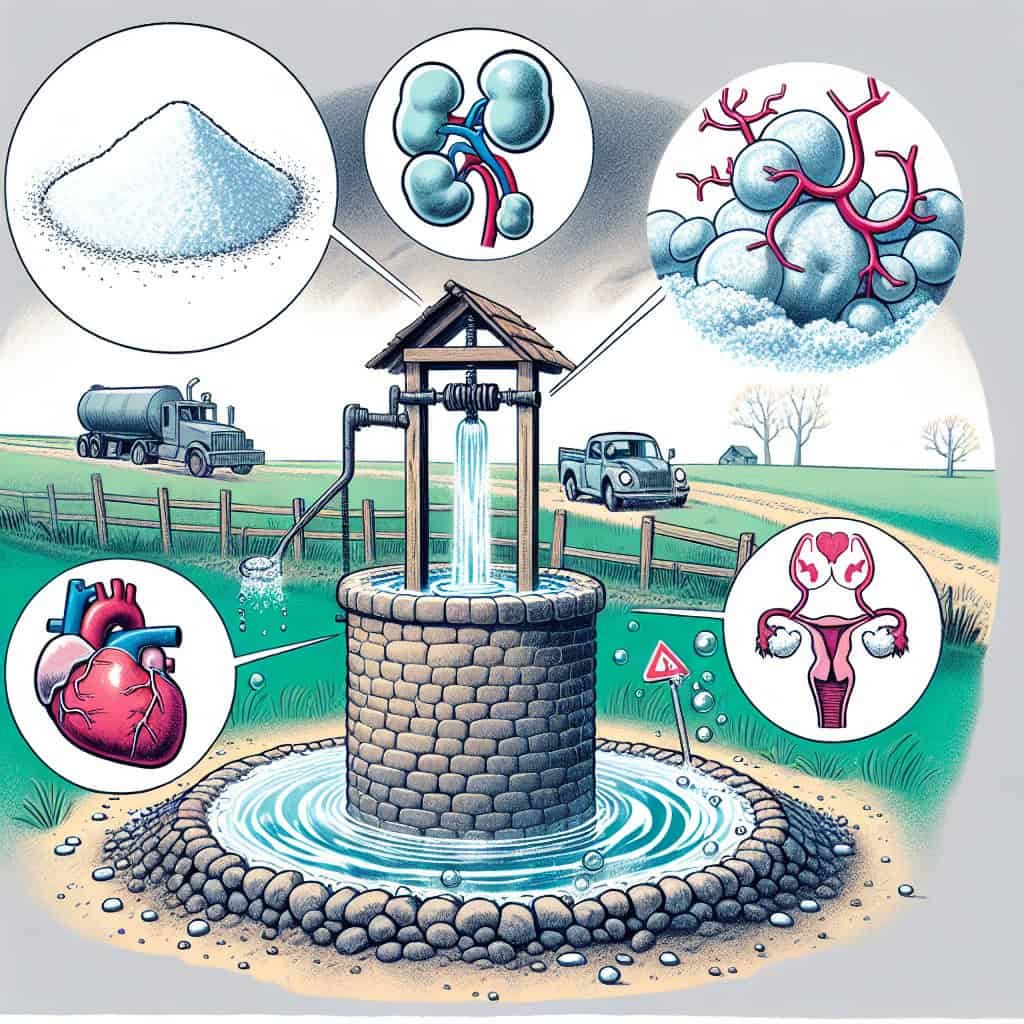Imagine you’re enjoying a glass of refreshing well water on a scorching summer day. But have you ever wondered about the potential health effects of excessive chloride in that seemingly innocent sip? In this article, we will explore the various health implications that can arise from consuming well water with high levels of chloride. From the impact on cardiovascular health to potential risks for individuals with specific conditions, we will delve into the importance of understanding and addressing the issue of excessive chloride in well water. Get ready to be informed and empowered to make healthier choices for yourself and your loved ones.

Impact on Human Health
Dehydration
Excessive chloride in well water can lead to dehydration. When chloride levels are high, it can cause an imbalance in the body’s electrolyte levels, specifically sodium and potassium. This imbalance can result in increased fluid loss through urination, leading to dehydration. Dehydration can cause symptoms such as thirst, dry mouth, fatigue, and dizziness. It is important to ensure adequate hydration and seek medical attention if symptoms persist.
Digestive Issues
High levels of chloride in well water can also contribute to digestive issues. Chloride plays a role in the production of stomach acid, which aids in digestion. However, excessive chloride intake can lead to an overproduction of stomach acid, resulting in conditions such as acid reflux, heartburn, and gastritis. These digestive problems can cause discomfort, pain, and interfere with your overall well-being.
Cardiovascular Problems
Elevated chloride levels in well water have been associated with cardiovascular problems. Studies have shown that high chloride intake can contribute to hypertension or high blood pressure. This occurs due to chloride’s impact on the body’s fluid balance, causing an increase in blood volume and thereby raising blood pressure. It is crucial to monitor and manage blood pressure levels, as hypertension can lead to more serious cardiovascular conditions like heart disease and stroke.
Kidney Dysfunction
Excessive chloride in well water has the potential to cause kidney dysfunction. The kidneys play a vital role in filtering waste and regulating electrolyte levels in the body. When chloride levels are elevated, it can put a strain on the kidneys and impair their function. This can lead to decreased urine output, electrolyte imbalances, and potential kidney damage or failure. If you experience any signs of kidney dysfunction, such as decreased urine or swelling, consult a healthcare professional.
Neurological Disorders
High chloride levels in well water may have an impact on neurological health. Chloride is involved in the transmission of nerve impulses and maintaining the balance of fluids in the brain and spinal cord. Imbalances in chloride levels can disrupt the normal functioning of these processes, potentially leading to neurological disorders. Symptoms may include confusion, seizures, and memory loss. If you suspect any neurological issues, seek medical advice for proper evaluation and treatment.
Effect on Children
Growth and Development
Excessive chloride in well water can negatively affect the growth and development of children. Adequate nutrition is crucial for children’s proper growth, and excessive chloride intake can disrupt nutrient absorption in the body. This may lead to stunted growth, delayed development, and impaired overall health. It is essential for parents and caregivers to ensure that children have access to safe drinking water that meets regulatory standards to support their growth and development.
Respiratory Issues
Children exposed to high chloride levels in well water may be more prone to respiratory issues. Chloride can irritate the respiratory system, leading to symptoms such as coughing, wheezing, and shortness of breath. These respiratory issues can be especially problematic for children with pre-existing respiratory conditions like asthma. Maintaining good indoor air quality and ensuring access to clean, chloride-free drinking water can help mitigate the risk of respiratory problems in children.
Renal Function
Kidneys are crucial organs responsible for filtering waste from the body, maintaining electrolyte balance, and regulating blood pressure. High chloride levels in well water can place additional stress on the kidneys, potentially impairing their function and leading to renal problems in children. Regular monitoring of kidney function and ensuring access to safe drinking water can help protect the renal health of children.
Cognitive Development
Excessive chloride intake from well water can also have implications for the cognitive development of children. Research has shown that high chloride levels can impact cognitive function, including memory, attention, and learning abilities. Children may experience difficulties in school and challenges in their overall cognitive development. Providing children with a chloride-free water source is vital to support their cognitive growth and ensure optimal brain development.
Risk for Pregnant Women
Intrauterine Growth Restriction
Pregnant women exposed to excessive chloride in well water may be at risk of intrauterine growth restriction (IUGR). IUGR refers to a condition in which the fetus does not grow at the expected rate, resulting in a smaller-than-average baby. High chloride levels can compromise blood flow to the uterus and placenta, affecting the delivery of oxygen and nutrients to the developing fetus. This can lead to long-term health consequences for the baby.
Preterm Birth
Elevated chloride levels in well water have been associated with an increased risk of preterm birth. Preterm birth refers to the delivery of a baby before 37 weeks of gestation. Studies have shown that high chloride intake during pregnancy can disrupt hormonal and biochemical processes, leading to premature labor and delivery. Preterm babies may face numerous health challenges and require specialized care in the neonatal period.
Impaired Fetal Development
Excessive chloride intake during pregnancy can negatively impact fetal development. Chloride plays a crucial role in maintaining the osmotic balance in the placenta, allowing for the exchange of nutrients and waste between the mother and fetus. When chloride levels are disrupted, this exchange may be compromised, leading to impaired fetal development and potential birth defects. Pregnant women should ensure access to chloride-free drinking water to support healthy fetal growth and development.
Impact on Elderly
High Blood Pressure
The elderly population is particularly vulnerable to the impact of excessive chloride in well water, as they are more prone to high blood pressure or hypertension. Consuming water with high chloride levels can contribute to increased fluid volume and subsequently raise blood pressure. This can lead to cardiovascular complications such as heart disease and stroke. Regular monitoring of blood pressure levels and access to low-chloride drinking water are essential for maintaining the health of the elderly.
Decreased Mental Function
Elevated chloride levels in well water can negatively affect mental function in the elderly. Research has shown that chloride imbalances can lead to cognitive decline, memory problems, and reduced mental acuity. These changes can significantly impact the overall quality of life for the elderly, affecting daily activities and independent living. Ensuring access to chloride-free water can support cognitive health in the elderly population.
Bone Health
Excessive chloride intake from well water can also have implications for bone health in the elderly. High chloride levels have been associated with increased calcium excretion from the body, potentially leading to decreased bone density and an increased risk of osteoporosis. Elderly individuals, who are already at a higher risk of osteoporosis, should pay particular attention to their water source and consider low-chloride alternatives to support bone health.

Dental Effects
Tooth Erosion
High chloride levels in well water can contribute to tooth erosion. Chloride can react with minerals in the teeth, weakening the tooth enamel and making it more susceptible to decay. Tooth erosion can lead to tooth sensitivity, cavities, and overall compromised dental health. Maintaining good oral hygiene practices and using fluoride treatments can help mitigate the effects of chloride on tooth erosion.
Gum Irritation
Excessive chloride intake from well water can also cause gum irritation and inflammation. Chloride can disrupt the natural balance of oral bacteria, leading to gum infections and gingivitis. Symptoms may include redness, swelling, and bleeding of the gums. Regular dental check-ups and practicing proper oral hygiene, along with using low-chloride water, are essential for maintaining healthy gums.
Increased Cavities
High chloride levels in well water have been linked to an increased risk of cavities. Chloride can contribute to the breakdown of tooth enamel, providing an environment conducive to cavity formation. Regular dental care, including professional cleanings and fluoride treatments, along with reducing chloride intake through drinking water, can help prevent cavities and maintain optimal dental health.
Skin and Hair Problems
Dry and Itchy Skin
Excessive chloride in well water can lead to dry and itchy skin. Chloride can disrupt the natural moisture balance of the skin, causing dryness and irritation. Individuals may experience symptoms such as itching, flaking, and redness. Using moisturizers and avoiding prolonged exposure to high-chloride water can help alleviate these skin problems.
Hair Dryness and Brittleness
High chloride levels in well water can also impact the health of your hair. Chloride can strip the hair of its natural oils, leading to dryness, brittleness, and increased hair breakage. Hair may appear dull, lifeless, and prone to split ends. Using sulfate-free shampoo and conditioner, along with rinsing hair with low-chloride water, can help maintain the health and appearance of your hair.
Skin Irritation
Chloride in well water can cause skin irritation for some individuals. Sensitive skin may react to high chloride levels, leading to redness, rashes, or even allergic reactions. Avoiding prolonged exposure to high-chloride water and using gentle, fragrance-free skincare products can help minimize skin irritation.

Impact on Plants
Reduction in Growth
Excessive chloride in well water can hinder the growth of plants. Chloride toxicity can disrupt the uptake of essential nutrients by plant roots, impairing their growth and overall productivity. Plants may exhibit stunted growth, yellowing leaves, and reduced yields. Ensuring proper irrigation techniques and using low-chloride water for plant care can help maintain healthy plant growth.
Leaf Burn
High chloride levels in well water can also cause leaf burn in plants. Chloride accumulation in the plant tissues can lead to necrosis or browning of the leaf edges and tips. This can significantly impact the aesthetic appeal of plants and compromise their overall health. Adjusting watering practices and using low-chloride water can help prevent leaf burn in plants.
Root Damage
Elevated chloride levels in well water can result in root damage for plants. Chloride toxicity can disrupt the functioning of plant roots, leading to reduced nutrient uptake and oxygen exchange. This can weaken the plant’s overall root system and make it more susceptible to diseases and insect damage. Using low-chloride water for plant irrigation and ensuring proper drainage are essential for maintaining healthy root systems.
Corrosion and Plumbing Issues
Damage to Pipes
High chloride levels in well water can cause damage to plumbing pipes. Chloride is corrosive, and prolonged exposure to high-chloride water can lead to the deterioration of metal pipes, fittings, and fixtures. This can result in leaks, bursts, and costly repairs. Regular inspection and maintenance of plumbing systems, along with using low-chloride water, can help prevent damage to pipes and prolong their lifespan.
Appliance Malfunctions
Excessive chloride in well water can also cause malfunctions in household appliances. Chloride can corrode internal components of appliances such as dishwashers, washing machines, and water heaters. This can lead to reduced appliance efficiency, frequent breakdowns, and the need for early replacement. Using chloride-free water or installing water treatment systems can help protect your appliances from the damaging effects of chloride.
Staining of Fixtures
High chloride levels in well water can result in the staining of plumbing fixtures. Chloride can react with metals commonly found in fixtures, causing discoloration and unsightly stains. This can affect the aesthetics of your bathroom and kitchen fixtures, diminishing their overall appeal. Regular cleaning and maintenance, as well as using low-chloride water, can help prevent staining of fixtures.

Environmental Impact
Contamination of Groundwater
Excessive chloride in well water can contaminate groundwater. Chloride can leach into the soil and percolate through the layers, eventually reaching groundwater sources. This contamination can have detrimental effects on the quality of drinking water for humans and wildlife. Proper waste disposal practices, water treatment measures, and adherence to regulatory standards are crucial for preventing chloride contamination of groundwater.
Effects on Aquatic Life
High chloride levels in well water can adversely affect aquatic life in rivers, lakes, and other water bodies. Chloride can disrupt the osmotic balance of aquatic organisms, impairing their ability to regulate water and electrolyte levels. This can lead to stress, reduced reproductive success, and even mortality in fish and other aquatic species. Monitoring and controlling chloride levels in water sources are essential for maintaining healthy aquatic ecosystems.
Ecosystem Disruption
Excessive chloride in well water can disrupt the balance of ecosystems. Chloride contamination can negatively impact vegetation, soil quality, and the overall biodiversity of an area. Changes in ecosystem health can have far-reaching consequences, including habitat loss, reduced wildlife populations, and disrupted ecological processes. Implementing sustainable water management practices and minimizing chloride pollution are crucial for preserving the integrity of ecosystems.
Regulatory Standards
Recommended Limits
Regulatory bodies set recommended limits for chloride levels in drinking water to protect public health. The specific limits vary depending on the region, but generally, the World Health Organization (WHO) recommends a chloride limit of 250 milligrams per liter (mg/L) for drinking water. It is important to regularly test well water for chloride levels to ensure compliance with these standards and prioritize the health and safety of individuals.
Monitoring and Testing
Regular monitoring and testing of chloride levels in well water are essential for identifying potential health risks. Homeowners with private wells should consider regular testing by certified laboratories to ensure the quality and safety of their drinking water. Testing can help detect any elevated chloride levels early on, allowing for appropriate action to be taken to prevent adverse health effects.
Water Treatment Options
If excessive chloride levels are detected in well water, various water treatment options are available to reduce chloride content. These treatment methods may include the use of reverse osmosis filtration systems, distillation, or ion exchange. Working with water treatment professionals can help determine the most suitable treatment approach based on individual needs and specific chloride levels present in the well water.
In conclusion, excessive chloride in well water can have significant impacts on human health, particularly concerning dehydration, digestive issues, cardiovascular problems, kidney dysfunction, neurological disorders, and various other physical and mental health issues across different age groups. Pregnant women, children, and the elderly are especially vulnerable to the effects of high chloride levels. Furthermore, chloride can also have detrimental effects on dental health, skin, hair, plants, plumbing systems, the environment, and water sources. Adhering to recommended chloride limits, regular monitoring and testing, and utilizing appropriate water treatment options are vital in safeguarding public health and minimizing the adverse effects associated with excessive chloride in well water.


